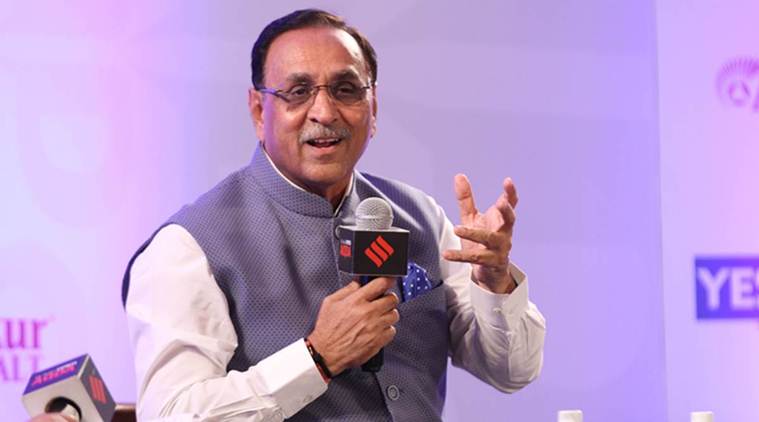- India
- International
Gujarat CM Vijay Rupani: ‘My govt enabled migrants to reach home with dignity, care’
My government has been successful in providing wages of more than Rs 1,000 crore to labourers (including migrants) and ensuring they are not fired.
 Gujarat Chief Minister Vijay Rupani. (File Photo)
Gujarat Chief Minister Vijay Rupani. (File Photo)
Gujarat, which reported its first positive case of Covid-19 as late at March 19, now reports the second highest mortality rate in the country. Chief Minister Vijay Rupani is among the few state chiefs who has been regularly talking to patients, health workers, families and front-line fighters of coronavirus. Excerpts from an interview to Leena Misra and Parimal Dabhi.
Farmers in Gujarat have been going through their worst for the past four years, and now when the harvest is ready, the organised markets are not there. Given that in times of this pandemic, the state is surviving on local produce, what is the plan for this sector?
Your claim of organised markets is incorrect. Sensitive to their concerns, the state administration allayed their (lockdown) fear by allowing farmers to carry out harvest and post-harvest activities, while following safety measures. In addition to that, we have provided relaxations to farmers for transporting equipment and as well as to irrigate their fields during the night.
Dispelling their concerns of finding markets for their produce, we reopened APMCs across the state in phased manner from April 15, ensuring adequate safety measures in-line with the MHA guidelines. So far, the farmers have sold more than 47 lakh quintals of produce in more than 120 APMCs. The state government has also begun the purchase of wheat, mustard and castor at MSP.
Gujarat has started sending migrants back to their home states. There has been no Covid-19 tests conducted on a mass scale in either the migrant colonies or shelter homes. What risk could this pose to the destination state?

The rescue work during the floods caused by the Machhu dam breach in Morbi in 1979 made me understand what a crisis means for the poor and deprived sections of the society. Today, while we are fighting Covid-19, the experience of 1979 has become a touchstone for me to act with utmost empathy.
Read| India coronavirus numbers explained: 1 lakh figure reached, but lockdown delayed it
This is the prime reason why my government is facilitating the return of lakhs of migrant workers from Gujarat. We strongly believe that they should be with their near and dear ones amid the crisis, which is why we decided to operate Shramik trains in close coordination with the Central Government.
Our district administration and health workers in co-operation with their counterparts in the respective states have been on toes to ensure that the migrants reach their home safely. They undergo health check-up before they leave Gujarat and also when they enter their home states. My government has helped them reach their homes with dignity. We have provided them buses to reach the railway station with all safety protocol as well as food and potable water during the journey.
I am happy to share that Gujarat has operated the maximum number of labour trains in India — 476 labour trains for 6.72 lakh migrant workers.
The migrants are the backbone of the state’s industry. Could the state government not have engaged them in some Covid-19 related jobs, get paid, and stay back with dignity?
As I said, it is not about employment but about ensuring their safety amid crisis.
All tasks associated with Covid-19 require some form of specialisation. Moreover, Gujarat has enough medical staff at its disposal. We have roped in private practitioners too. And very recently, we have decided to reopen all the private hospitals in Ahmedabad.
However, we ensured their safety by putting up labour camps at a cost of Rs 40 crore. My government was successful in providing wages of more than Rs 1,000 crore to labourers during the lockdown.We initiated the Anna Brahma Yojana for providing free foodgrains to all migrant workers and non-ration card holders. We also distributed food packets to those without cooking facilities.
Read| Gujarat Deputy CM Nitin Patel: Staying at home saying ‘corona corona’ is not going to help
We decided to resume industries and business units from April 20, in accordance with adequate safety protocols. More than 7 lakh workers were employed in more than 45,000 industrial units. At the same time, more than 30,000 labourers are employed at around 700 private construction sites.
Is the state justified in making the migrants pay for their tickets to travel to their home state?
The Gujarat government is not charging for tickets or any other facility provided to the migrant workers during the journey. We do the registration of labourers, provide them buses to be transported to railway station and facilitate their boarding.
In spite of three strictly implemented lockdowns, cases in Gujarat have been seeing a steady rise. Why has Gujarat not been able to flatten the curve?
The battle against Covid-19 is a long drawn process. We must be patient and disciplined for the same. At the same time, we must follow all the necessary safety protocols and learn to live with Covid-19. The crisis is not limited to Gujarat. We must look at it through a holistic and comprehensive approach. The state government has done intensive testing across Gujarat. So far, we have tested more than 1.27 lakh people with a daily capacity of 3,000. I am happy to share that the recovery rate has increased in the past 10 days and reached 40.62% and more than 4,000 people were discharged during the same period. We will witness a flattening curve very soon, not just in Gujarat but in India.
To contain the virus spread in the walled city areas of Ahmedabad, the authorities ramped up testing and police and civic authorities were deployed seeking out Tablighis. Do you think, in the process, those, now called ‘super spreaders’, were ignored and the virus spread to other areas?
It is unfortunate that Tablighis not only hid their travel history but they also kept on meeting people in the old city area, which is densely populated, posing a challenge to the society at large. We responded by aggressive surveillance, testing and identification of the infected people, followed by their isolation and treatment. This helped in bringing the situation under control.
Read| Govt forms committee for economic revival of Gujarat
Later on, we started large-scale testing of vegetable vendors, and grocery shop owners in Ahmedabad, Surat and Vadodara. More than 18,000 super spreaders were tested in Ahmedabad alone. Around 9,000 more will be tested. This is going to be a continuous and an on-going exercise…
Would you blame only the Tablighis for the spike in the cases in Gujarat?
There is no doubt that a large number of cases in Ahmedabad emerged due to Tablighi Jamaat. The data showed that a large of number cases registered in Ahmedabad were directly linked to the Tablighi Jamaat. Statistics show that 80% of the cases in Ahmedabad originated from 20% area of the city. However, another aspect of the rise in number of cases is our increase in the testing capacity. We are focusing on increasing our testing capacity as we aim to identify more and more affected people in a short span of time.
The coronavirus hit many other states in India before it came to Gujarat, giving the state enough time to prepare. Do you think Gujarat was late in reacting?
We took right steps at the right time. The Centre and my government worked in sync to devise ways based on our demography and socio-economic status.
If you look at the statistics of 50 days, you will find that the rate of spread of Covid-19 in India is quite low and the recovery rate is higher compared to other developed nations. I am happy with the pro-active measures adopted by the Central government and my government during the crisis, be it screening of passengers before the first Covid-19 case in Gujarat, setting up of dedicated hospitals within a week, provision of sufficient medicines and equipment like ventilators, masks, sanitisers or testing more people every day… we have progressed with effective micro-planning and management at every stage. This is the prime reason why the discharge rate has risen to 40% compared to 18% 10 days ago. We are facing new challenges as time progresses and we are finding the best possible ways to overcome them.
There was a sense of confusion in Gujarat every time the Centre put out guidelines for easing the lockdown. Could the state have done better given the advantage it is the home state of the Prime Minister and Union Home Minister?
During the global pandemic, my administration was prepared well in advance to curtail the spread of infection. We had already announced a state wide lockdown prior to the March 24 nationwide lockdown. The state government ensured to implement the rules and regulations as issued by the MHA. Subsequent measures were adopted for Lockdown 2.0, 3.0 and 4.0 as well.
There is no discrepancy in implementing and enforcing the guidelines as issued by the Central Government. The prime aim of both the Centre and the state governments during the pandemic has been: saving lives and saving livelihoods.
The former was ensured with the implementation of successive lockdowns; the latter was an effort to restore normalcy and bring the economy back on track. We resumed APMCs, industrial units outside municipal limits, and export units within city limits, excepting containment zones, in April. To ensure employment for the poor, we started the third phase of Sujalam Sufalam Jal Abhiyan from April 20, and decided to undertake various works under its umbrella.
Amid all this, we ensured an uninterrupted supply of essential items like food items, milk, vegetables, fruits, masks, sanitisers and medicines for the common people. The model of cooperative federalism has strengthened under the leadership of Modiji. Being the home state of Honourable Prime Minister and Honourable Union Minister, Gujarat has benefitted immensely. Moreover, we keep seeking their guidance from time to time.
Where do you see the state’s economy by Diwali this year?
We are hopeful that the state’s entrepreneurial spirit that shaped a vibrant and resilient economy will help bounce back this time as well. I am happy to share that Gujarat is open to investments and trade in a post Covid-19 world. Around 33,000 hectares of land is available for industrial use in Khoraj, Sanand, Dahej SEZ Saykha, Dholera SEZ and other private SEZs. My government has decided to provide ‘Plug and Produce’ facility through a GIS-based land bank system.
Besides, process approvals for new industries (be it foreign industries or industries from outside Gujarat or MSME units) that wish to establish themselves in Gujarat will be 100 per cent online. They will be allocated land within 7 days and all the necessary permissions shall be provided in 15 days of their application. Gujarat’s Department of Industries and Mines, in collaboration with the Department for Promotion of Industry and Internal Trade (DIPP), GOI, has envisioned to contact the embassies and industries of foreign nations to establish their units in Gujarat. We have also decided to consult JETRO, KOTRA, USISPF and USIBC to encourage their industries to establish their units in Gujarat.
The new industrial units will be provided with relief from all the related Industrial acts and norms for 1,200 days. However, they will be bound to follow Minimum Wages, Act, Industrial Safety Rules and The Employee Compensation Act.
The state government shall also facilitate in helping the foreign industries to find joint venture partners in the state.
What austerity measures the state government is considering in the wake of substantial cut in its tax-based income?
The Indian economy has been severely hit in the past 50 days of lockdown. Gujarat, being one of the top performing Indian states, has seen a dent in its tax-based income. Of course, these are difficult times.
However, we are doing our best to restore normalcy in the state. Our growth model, is a display of the spirit of austerity of the Gujarati people and it is truly reflected in our budget provisions too.
When the government decided to send back migrant workers from Surat to their homes in Amreli, Bhavnagar and Botad, did it not run a risk given that Amreli, then was Gujarat’s lone zero district?
We have made it clear that the government will not permit travel from one containment zone to another. Once the application of a worker is approved on the portal, they undergo health screening to determine if they are healthy to travel. There is a health check-up when they return to their native place and they are quarantined at home or institutionally for 14 days.
What is the one message you would give the people in this time of the pandemic?
I would like to thank 6.5 crore Gujaratis for their trust and co-operation during such a crisis. At the same time, I would like to thank all the selfless corona warriors — doctors, nurses, paramedical staff, police personnel, health and sanitation workers and all others who are engaged with the government in curbing the crisis.
We must tread cautiously… It is a long drawn battle that demands patience, persistence and perseverance. We must learn to live with Covid-19. At the same time, we should inculcate the use of masks, sanitisers in our everyday life and follow social distancing religiously.
Apr 27: Latest News
- 01
- 02
- 03
- 04
- 05








































